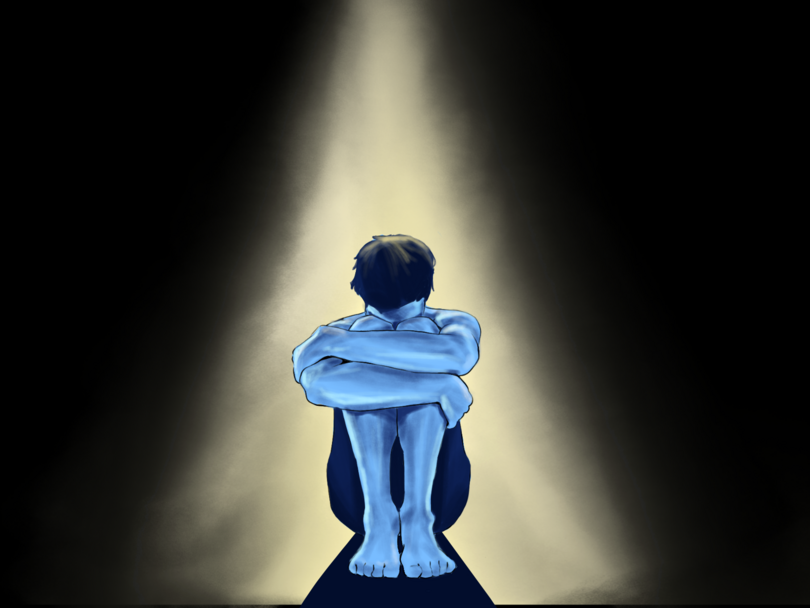Personal Essay: Make room for your grief, even in today’s hustle culture

Grief is a universal experience, our essayist writes, which doesn’t allow us to pause to process our feelings. They share perspective on how loss and happiness may coexist without shrinking the significance of either emotion. Khloe Scalise | Contributing Illustrator
Get the latest Syracuse news delivered right to your inbox.
Subscribe to our newsletter here.
Just five weeks into my freshman year at Syracuse University, I had to unexpectedly travel home after the loss of my grandfather. The 10-hour bus ride gave me plenty of time to reflect – not only on the past month, my new life at college and the friends I’ve made, but also the recent loss I carried.
I arrived home with the already-pressing weight of his absence, and I knew one of my first tasks would be confronting the space he’d filled for so many years. I spent the next morning at my grandfather’s house to sort through his belongings: his watches, vintage history books, the flannels he always wore and even the pictures I drew for him and my grandmother as a child that were still pinned to the wall.
Handling these objects felt like touching pieces of my family’s history. Each item was a quiet reminder of the role he’d played in my life or prompted questions that would forever remain unanswered. Going through his belongings wasn’t just a matter of deciding what to keep, but it also forced me to reckon with what it will mean to no longer have him in my corner as life continues around me.
I returned to SU with that burden. Classes progressed, assignments piled up and campus life carried its usual momentum, seemingly oblivious to the loss occupying my mind.
It quickly became clear that grief and growth can occur simultaneously, and I’ve realized it’s OK not to have everything figured out – even in a society centered on constant productivity.
During phases of our lives that are supposed to be new and exciting, such as the beginning of college, our generation’s focus on forward momentum subtly pressures us to set grief aside — even though processing loss is essential for emotional well-being.
Social media heightens this expectation, offering a nonstop feed of curated moments that suggest everyone around us is thriving. Amid birthdays, holidays, graduations or the simple rush of everyday life, it can be overwhelming to add the weight of loss to our existing commitments.
This pressure is especially true for young adults who are often navigating multiple transitions at once – starting college, entering the workforce or forming new relationships. Emphasis on hustle culture can make grieving in any form, whether it be a death or a breakup, seem inconvenient or even shameful.
But, acknowledging loss can coexist with happiness doesn’t diminish the significance of either. Experiencing joy doesn’t erase sorrow, just as carrying grief shouldn’t take away from the celebration of milestones and achievements. Recognizing this duality allows us to honor our losses while still being able to move forward.
It quickly became clear that grief and growth can occur simultaneously, and I’ve realized it’s OK not to have everything figured out – even in a society centered on constant productivity.Addy Kimball, Essayist
The way we handle grief also varies significantly by location. In the United States, where productivity to the point of burnout is worn like a badge of honor, taking time to pause and take care of ourselves at a time we need it most can feel indulgent.
In fact, the U.S. is reported to rank 29th among 36 advanced nations on work-life balance in the OECD’s Better Life Index. By contrast, countries like New Zealand, Belgium and Ireland score much higher thanks to short work weeks, stronger leave policies and cultural norms that value rest as much as work. These structures create more room for people to process life changes, such as grief, without feeling as though they’ve fallen behind.
Some countries even embrace practices that directly resist hustle culture. In the Netherlands, for example, the concept of “niksen,” or “the art of doing nothing,” is widely discussed as a remedy for burnout. While it sounds simple, the practice reflects a broader cultural acceptance of slowing down to make space for stillness.
Ideas like this reveal that grief doesn’t have to be something we push aside until things settle down for us. Instead, it can be a process that moves alongside life’s routines, allowing for both reflecting and carrying on.
In the past two weeks on campus, reminders of my grandfather have shown up in small, everyday ways. An old country song plays in the dining hall that makes me wonder if he once knew it, a brief scent of mint reminds me of his favorite chocolates and passing flowers makes me think of my grandmother’s garden at their house.
On top of these moments, the digital picture frame my mom gifted me for move-in seems to display photos of him now more than ever. The reminders are bittersweet, but they make me smile. They help me honor his memory every day.
It’s possible to move forward even while experiencing heartache. When life forces you to mourn at a time you feel expected to celebrate, it’s important to give yourself permission to acknowledge your needs. Pause when you need to. Process without guilt.
By carrying grief while striving to become the person we want to be, we honor both those we have lost and the life we continue to live.
Addy Kimball is a freshman majoring in political science. She can be reached at akimba02@syr.edu.





